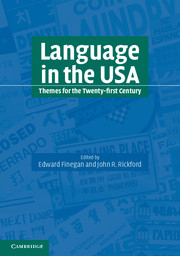Book contents
- Frontmatter
- Contents
- List of figures
- List of tables
- List of contributors
- Acknowledgments
- Foreword
- Editors' preface
- Part 1 American English
- Part 2 Other language varieties
- Part 3 The sociolinguistic situation
- 15 Language ideology and language prejudice
- 16 Ebonics and its controversy
- 17 Language planning, language policy, and the English-Only Movement
- 18 Language in education
- 19 Adolescent language
- 20 Slang
- 21 Hip Hop Nation Language
- 22 Language, gender, and sexuality
- 23 Linguistic identity and community in American literature
- 24 The language of doctors and patients
- 25 The language of cyberspace
- 26 Language attitudes to speech
- Index
20 - Slang
Published online by Cambridge University Press: 05 June 2012
- Frontmatter
- Contents
- List of figures
- List of tables
- List of contributors
- Acknowledgments
- Foreword
- Editors' preface
- Part 1 American English
- Part 2 Other language varieties
- Part 3 The sociolinguistic situation
- 15 Language ideology and language prejudice
- 16 Ebonics and its controversy
- 17 Language planning, language policy, and the English-Only Movement
- 18 Language in education
- 19 Adolescent language
- 20 Slang
- 21 Hip Hop Nation Language
- 22 Language, gender, and sexuality
- 23 Linguistic identity and community in American literature
- 24 The language of doctors and patients
- 25 The language of cyberspace
- 26 Language attitudes to speech
- Index
Summary
Editors' introduction
This chapter deals with slang – a subject of perennial interest to college students and to many other age groups. As Connie Eble notes, slang words and expressions cannot be reliably distinguished from other vocabulary items by how they sound or how they are constructed. (Like other vocabulary innovations, they may draw on old words or parts of words, and make use of metaphor, irony, and metonymy.) Instead, slang is usually deliberately chosen over more conventional vocabulary to send a social signal – to mark informality, irreverence, or defiance; to add humor; or to mark one's inclusion in, admiration for, or identification with a social group, often a non-mainstream group. Slang is, as she suggests, vocabulary with attitude.
Slang is most commonly created and used by youth (see chapter 19 on language and adolescence) and it is often ephemeral in nature, like fashions in clothes or cars. But some slang terms persist for long periods, like bull ‘empty talk,’ while others, over time, become general American colloquialisms, like buck ‘dollar’ (which dates from 1856). Slang is most commonly used to describe types of people, relationships, social activities, and behavior (e.g., inebriation, which boasts more slang terms, in the USA, than any other concept), and judgments of acceptance or rejection.
Two important elements in American slang are non-mainstream cultures and music, and from both perspectives the ethnic group that has made the most significant contributions to slang in recent times is African Americans.
- Type
- Chapter
- Information
- Language in the USAThemes for the Twenty-first Century, pp. 375 - 386Publisher: Cambridge University PressPrint publication year: 2004
- 7
- Cited by



